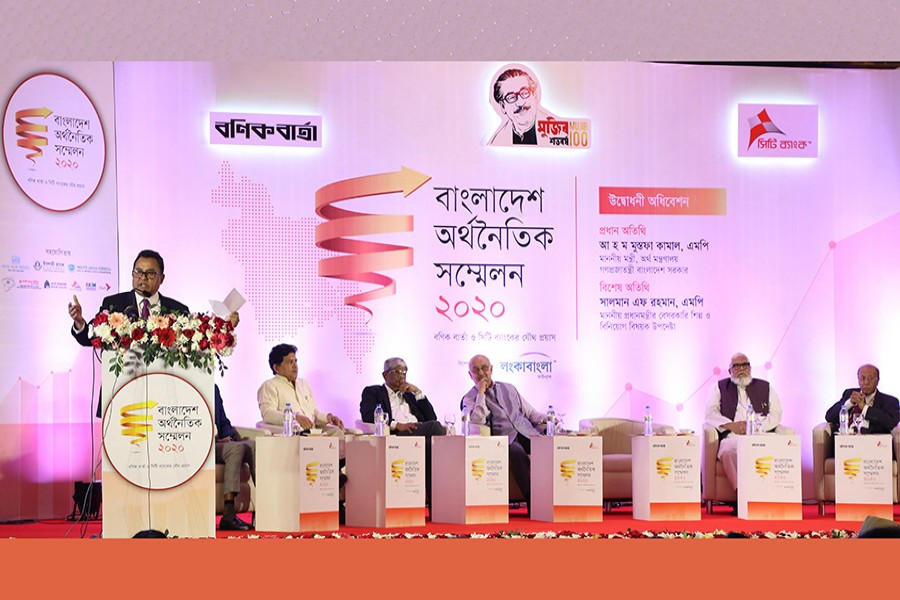Warning against complacency, speakers on Thursday called for assessing dismal economic indicators such as non-performing loans, ailing stock market, sluggish export income, and rising inequality.
The call came at an economic conference organised on the eve of birth centenary of Bangabandhu Sheikh Mujibur Rahman. The City Bank Ltd and Daily Bonik Barta jointly organised the event.
Former governor of Bangladesh Bank Dr Salehuddin Ahmed said it is high time the nation did self-criticism rather than becoming complacent.
"We need to avoid propaganda-like talks-we have done a lot, we will do it, and it will be done, etc," he said.
Mr Ahmed said though growth rate, forex reserves and inflation rate are bright spots, many other key economic indices, including private investment and corruption are something to be worried.
Mr Ahmed said capping interest rates of bank deposits and loans at 6.0 per cent and 9.0 per cent is not practical.
"Fixing rate in the market economy means we are going back to the eighties."
He said the inequality between the poor and the rich is high-both in terms of income and asset. "You can't lower inequality by social safety net programmes," he said.
Mr Ahmed also suggested reforming the macro-economy, fiscal, and monetary policies.
Economist Rehman Sobhan said it is time to look ahead rather than self-celebration.
"That is more productive to see what can be achieved in the future," he said.
Asking all to remain prepared for any economic shock, he said the impact of coronavirus epidemic is a lesson to all.
"At the moment, we are getting a small piece of fallout from the coronavirus in terms of impact on our supply chain of our export sector," he said.
"The main message of the disruption from the epidemic is we should over a period of time be prepared for random shocks, which can affect our economy," he added.
Professor Sobhan urged the authorities to fix the financial system.
Former economic adviser to a caretaker government Dr AB Mirza Azizul Islam said there is a relation between growth and development, but growth cannot guarantee development.
"Many other factors need to be taken into consideration if you talk about development."
In Bangladesh, he said, growth is intensified, remittance flow is good, but the market needs to be diversified. "The inward remittance flow is well in shape but needs to pay attention to outward remittance." Mr Islam also said export income is in the negative territory-the policy of dependence on a single product is not sustainable and it needs to be changed.
He said the private sector investment is low and banks are weighed down by soured loans.
"The statistics on NPLs (non-performing loans) showed by the government do not follow international standard," he said indicating the distorted calculation.
Mr Islam said the relationship-based lending, political influence, and lengthy legal system in disposing cases are responsible for the large volume of NPL, which threw the banking system into trouble.
He said bank depositors would not get any returns, rather will incur a net loss if they keep money in banks at 6.0 per cent interest rate.
Explaining the reason, he said the inflation rate is nearly 6.0 per cent, there is 15 per cent tax on interest, and a fixed excise duty is also applicable.
"Thus, people will feel discouraged to keep deposits in banks and the volume of deposits in banks will fall and private sector lending will fall further," he added.
Chairperson of BRAC Dr Hossain Zillur Rahman said the country now needs to discuss the near-term challenges instead of looking back.
He stressed the need for finding new growth drivers instead of depending on the apparel sector alone. Otherwise, he said, growth rate may face a bump.
"We have to raise skill of labour. We can't reach the middle-income country status with low-cost labourers, rather have to create high productive labour," he added.
Prime Minister's private sector industry and investment adviser Salman F Rahman said the size of country's budget has increased significantly and a large volume of development work is taking place.
He recognised the roles of both the government and the private sector in their journey towards development.
Regarding rising inequality, Mr Rahman said there is inequality in every country, developing and developed nations alike.
Finance minister AHM Mustafa Kamal said Bangabandhu Sheikh Mujibur Rahman and independence are closely linked.
"The father of the nation dreamed of poverty and hunger-free country. No hunger will remain in Bangladesh by 2030 and by 2041, it will be a wealthy country," he said.
The minister responded to criticisms made by economists on the economic indicators.
He said now sales of savings instruments have been made automated to check the misuse of benefit.
About the stock market, he said he does not work on the ups and downs of the bourses. "My work is about strengthening the economy. If I can strengthen the macroeconomic indicators, it will be reflected in the stock market," he said.
Mr Kamal attributed costlier bank credit and the compound interest rates to the large volume of troubled loans.
"If interest rate is such high, how can industrialisation happen?" he asked.
"Low interest rate is crucial to the industrialisation in the country," he said.
Managing Director of City Bank Mashrur Arefin delivered the welcome address. Bonik Barta editor Dewan Hanif Mahmud moderated the session.


